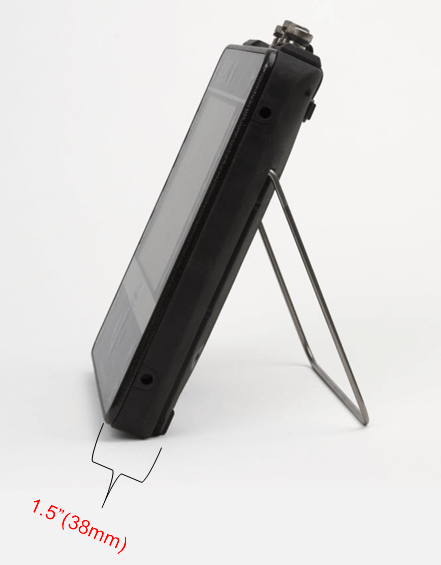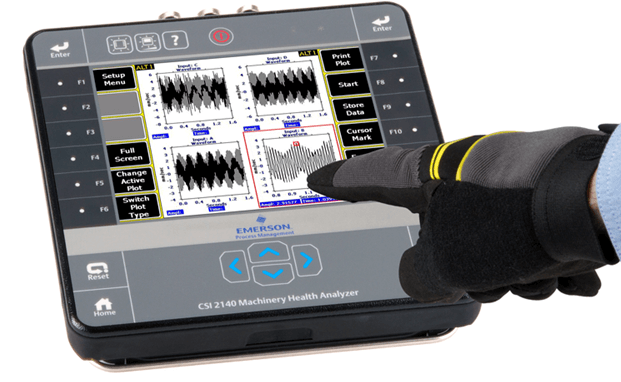You may have seen the news of a next generation of portable vibration analyzer, the CSI 2140 Machinery Health Analyzer. Portable vibration analyzers are great for providing advance warning of machinery failures as part of a predictive maintenance program. The CSI 2140 provides a significant technology improvement over the CSI 2130, long known for its fast vibration data collection capabilities.
I first became aware of this product last week when whispers were going on about it, in some of the social networks. I turned to Emerson’s Drew Mackley, to give me some more details than what’s in the press release that I could share.
Like many of the new and upgraded technologies I’ve highlighted, a human centered design (HCD) approach was taken in the development process. The news release highlights the improvements:
…new four-channel simultaneous data collection functionality, wireless and Bluetooth® wireless technology communication, and a full-color touchscreen. The CSI 2140 also delivers fast route collection capabilities, enabling workers to spend more time on higher-value tasks.
 Drew noted that since this is a portable unit, size and weight were key areas of focus. At 1.5″ (38mm), it’s now the thinnest vibration analyzer out there and easier to operate and hold. Also, the battery life was increased to over 10 hours between charges to be able to cover an entire shift. Other ergonomic improvements include a large 7.5″ (190.5mm) diagonal touchscreen that works even with gloves on, and a brighter screen that visible even in full sunlight. Brightness auto-adjusts just like we’ve come to expect from our smart phones.
Drew noted that since this is a portable unit, size and weight were key areas of focus. At 1.5″ (38mm), it’s now the thinnest vibration analyzer out there and easier to operate and hold. Also, the battery life was increased to over 10 hours between charges to be able to cover an entire shift. Other ergonomic improvements include a large 7.5″ (190.5mm) diagonal touchscreen that works even with gloves on, and a brighter screen that visible even in full sunlight. Brightness auto-adjusts just like we’ve come to expect from our smart phones.
 As part of the HCD effort, the speed of data collection was also a focus. Having to collect data in exceedingly hot/cold/noisy/hazardous areas means the faster you can collect the data, the sooner you’re out of that area. The data collection speed has been increased by 30-60%.
As part of the HCD effort, the speed of data collection was also a focus. Having to collect data in exceedingly hot/cold/noisy/hazardous areas means the faster you can collect the data, the sooner you’re out of that area. The data collection speed has been increased by 30-60%.
A big advancement on the data collection side is the number of channels that can be collected, up to four-channel analysis plus phase. Drew explained that four-channels provided the ability to collect data in the x-, y- and z-axis along with a reference vibration. For those that are familiar with vibration measurement, this simplifies route collection, cross channel, transient, bump, 4-plane balancing, AC motor rotor bar, and Operating Deflection Shape (ODS)/Modal analysis.
The onboard analysis includes PeakVue early bearing and gear fault detection, autocorrelation (determines periodic or random impacting), field alarming showing severity via color, fault frequencies (to identify vibration source), parameter trending (to show fault severity and degradation rate), and analysis expert troubleshooting tests.
Technicians have this data available not just locally on the device, but remotely back at the AMS Machinery Manager via Wi-Fi. This allows a member of the team to analyze the data already collected while another team member is collecting more routes. Bluetooth is also available to connect other peripherals to the device.
I can’t cover all the other great things such as SD slots for additional memory, and comfortable carrying strap, and more in this post, so I’ll point you to the page where Drew and the team have put additional information.
It’s great to continue to see technology advancements that begin with the users and the tasks that they perform. It translates into better, more intuitive products.
Update: I’ve received feedback and tweaked two data collection sentences in the original post.




